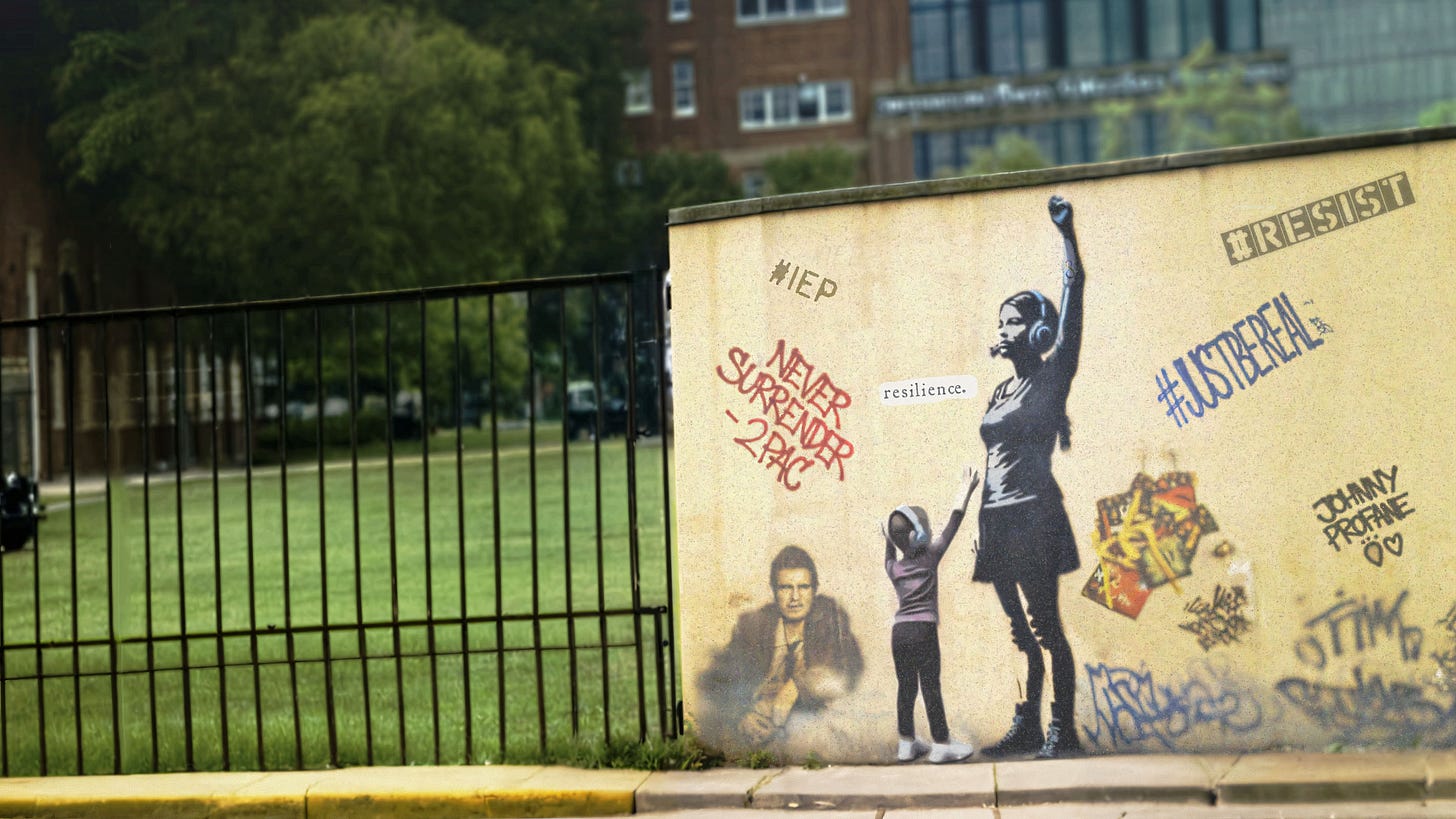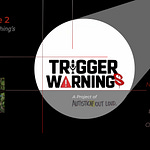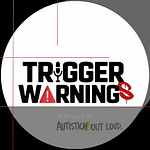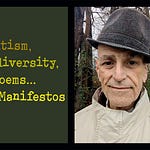Cold Open
You wanna pathologize me? Knock yerself out. Faithfully counting every leaf marked "deficit"…
But missing the whole damn forest we know locally as "Survival."
Intro
You're listening to AutisticAF Out Loud. One voice. Raw. Real. Fiercely Neurodivergent. Since 1953.
Season 5, Episode 5. “Doc? You Got Us All Wrong, Pt 1: Autistic Resilience.”
Deficits… or strengths? Survival… or thriving? Pathology… or inborn, natural autistic behavior? We turn the diagnostic telescope around. Let’s focus on the forest of resilience behind every leaf labeled "deficit."
An experimental multi-part series… all around 10 minutes. Because some neurodivergent listeners like to binge in small bites. Or you can download Part 1 and Part 2 at once… for listeners who crave the whole enchilada in one sitting.
Just one autistic elder's truth. I'm Johnny Profane.
Content Note: trauma discussion, medical system critique, institutional discrimination, psychiatric hospitalizations, systemic oppression + experiences & opinions of one autistic voice... in my 70s.
[Music]
What I tell any therapist… any caregiver… first session:
I have survived physical and sexual abuse from family and schoolmates.
Bullying by teachers and fellow students… 2nd grade through high school.
Multiple professional crashes… in multiple careers.
At least a dozen firings.
2 evictions.1 bankruptcy.
Dozens of major household moves.
Few friends, and…
2 divorces, 3 "living togethers," and a couple of "serious" relationships that, well…, weren't?
Ain't this resilience?
Resilience. Ya know, that cap-and-gown term pros use for getting knocked down seven times. Stubbornly getting up… eight...
I'm still alive. Still creating. Still getting published. Still speaking to thousands of autistics a year.
Never attempted suicide... despite three hospitalizations.
AND I'm still autistic. Cuz there ain't no cure for something that ain't wrong. Unless you base your "medical model" on some statistical "normal"… which is just a made up story. Cuz not one living person is summed up by a Bell curve normal… not even within a standard deviation.
Yes, yes… yes. Some professionals are evolving. Pros who listen more than lecture. But face it. In the grand scheme of things… they’re rare.
Let's get clear right now, right here. It's not being autistic that creates our trauma. It's living autistic in a society that inflicts trauma on us. Refusing to accept, adapt… support… us.
Why do "helping" pros focus on my deficits, my lacks, my pitiful performance of “Activities of Daily Living”…? Like, did I shower today…? No.
Rather than the sheer strength of will I demonstrate every time I take my next breath?
Why do they offer to fix me,
inform me,
guide me, and
charge me for sessions,
mentoring,
workshops,
best-selling books,
SYSTEMS they've just invented…
based on… at best… incomplete research?
[Music]
You know social media… if you like and share this podcast, a lot more people will check it out. You can do a lot of good with just one click.
You wanna pathologize me? Knock yerself out.
Turn my every inborn neurodivergent characteristic into a disease. You do have powerful diagnostic tools…
But you're looking through that diagnostic telescope backwards. Faithfully counting every leaf marked "deficit"… But missing the whole damn forest that we know locally as "Survival."
Like my "failure to maintain eye contact.” A “social deficit.” Right... completely missing how that survival skill lets me process your words… without painful sensory overload. My form of my respect… for you.
Go ahead and use professionally, objectively disempowering terms, like "comorbidity"... betraying your bias that my very way of Being is… in your eyes… a disease. And then riff on, elaborate away:
"pathological demand avoidance,"
"obsessive-compulsive disorder,"
"borderline personality disorder,"
And on and on… and on.
Truth? Every diagnosis? Just another survival mechanism. Not symptoms of autism. Responses to how society treats autism.
Behaviors that kept me alive… in your world. While you obsess over what's "wrong" with me…
Or… we could build on my autistic strengths.
Look, none of us have all of these. And superpowers don’t exist. Some have strengths not listed. But if you aren’t looking for them? Likely, you’re mis-treating us.
Resilience: Just surviving multiple, severe stressors is a biggie. Every autistic adult you meet has adapted to extreme challenges. Most of us… traumatized. Yet we endure. We integrate. We keep going.
Deep Feeling: Pros call ‘em "mood swings." We call it feeling everything… deeply. Depth that drives our creativity… in science, art, writing, becoming lunatic billionaires… or the cool neighbor next door.. It's not a flaw. It's fuel.
Survival Skills: My life, my continued existence… is my proof. Just as any autistic adult's life is. We've survived devastating life events. With inner strength and coping strategies.
These aren't skills most professionals understand… not even some neurodivergent practitioners. Because these skills are linked to how our individual autistic minds work. Which is… in fact… different. Not just from most humans. From each other, too.
Creative Persistence: Every autistic person knows this pull. Our passionate focus on our interests. Grabbing us deeper than hunger. We don't just see details… no matter what TV tells you. We work on wide canvases. We create. We build. We solve. That's strength.
Living with Extremes: My knee surgeon was shocked. "You walked two miles a day on a torn meniscus?" Yes, but… a light touch on my face can trigger panic. That's not contradiction. That's how we survive. We may get sensory warnings earlier than most… Yet we handle what breaks others. Daily.
Hidden Adaptability: Look at my life changes—jobs, homes, relationships. Society labels us as "rigid." Truth is, we adapt constantly. We got no choice. Yet we persevere. We keep doing. That's not weakness. That's strength.
Processing Power: We take in everything. Process it deeply. Yet live through emotional and sensory experiences that would derail most people. We keep going. Keep growing. That's not dysfunction. That's determination. Coming directly from… not despite… our neurodivergent cognition.
Spectrum of Strength: Maybe resilience is a spectrum, too. And some of us autistics crank it up past 11. Not weakness from disability. Strength from difference. Turning autistic stereotypes upside down. Yet again.
[Music]
Just a quickie… this is Part 1 of “Doc? You Got Autism All Wrong?” Why not binge the next part? Or download the long-form version with both parts? Link in transcript.
Challenging Normal-izing Models
My story? Just one among thousands. Millions.
I've worked as a magazine publisher. Functioned as an academic grad student… multiple times. And been homeless… multiple times. I've been privileged to hear many, many similar stories over the decades. At all levels of society, education, age.
These stories all share one truth: Autistic traits are not inherently deficits. They can be hidden sources of strength and resilience. In the right environment. In the right community.
Take one example: Pathological Demand Avoidance (PDA). What pros like to label our natural, neurodivergent response to external demands like deadlines.
I meet the diagnostic criteria. Always have. But in my opinion, they bulldoze right over my inborn need for autonomy. Leading too often to trauma. PDA… seems to me… a dehumanizing slur. For the nature I was born with.
Yet many neurodivergents find comfort and support diagnosed as PDA. In the acknowledgment of our differences the diagnosis does offer. I don’t wish to negate their experience. And I’m not arguing neurodivergents do NOT have needs for autonomy. Or that we don't suffer due to these differences. At the hands of Straight Culture.
My point: Sensory and social differences are NOT pathologies.
It's like dogs noticing that cats are more hyper than canines...
So to "help" ‘em, pro dogs decide to forcibly train or torture every cat. To steamroll them into converting to “Dog Normal.”
We are human… autistic humans.
We need what all humans need:
To build on our strengths.
To find our nurturing environments.
To choose our supportive communities.
We just accomplish these things... differently.
Look, I'm fighting the whole Normative Narrative. Which demands any difference MUST be "cured." Or at least fixed.
And I’m not keen on neurodivergent-based attempts to bandaid the problem. By simply defining a new normal for autistics and other neurodivergents. Just another standard we may fail to live up to.
Frankly, I'm calling for a strengths-based, non-normative psychology for all neurodivergents. A theme I develop in this series and future podcasts. How we might replace CBT and similar treatments with more neurodivergent-centered alternatives.
So where do we start this revolution?
Doc, Stop. Look again…
At the big picture this time. See those brilliant sparks of unusual strength? Far more powerful than your "deficits."
Reality check: Up to now, you've just been documenting how modern consumer culture fails our neurology. In the office. In our schools. In shopping at freaking Walmart for fuck's sake.
Anywhere we’re forced to process too much sensory input. Or pretend to read invisible social cues. Pretend we’re you… without rest or accommodation.
Let’s explore a new direction. Simply put?
Doc… stop looking through your telescope backwards. Look at us. Right in front of your eyes.
Outro
Thanks for listening. Hope to hear your thoughts in the comments.
For your deeper diving pleasure, the transcript contains references and footnotes for most points I raise. From a variety of views.
Hey, don’t forget, you can download Part 2, "CBT...? Never Worked for Autistic Me” right now for your bingeing pleasure. Or download both parts in one podcast. Together they begin to explore how neurodivergent folks can build sustainable, authentic lives… with or without professional intervention. With 2 more parts coming…
AutisticAF Out Loud podcast is supported solely by listeners like you. If you have a friend or family member touched by neurodiversity? Why not turn them on to us with a quick email?
By the way, we believe no one should have to pay to be autistic. Many neurodivergent people can't afford subscription content.
Your Ko-Fi tip of any amount helps keep this resource free for them. Or join our paid subscriber community at johnnyprofaneknapp.substack.com for ongoing support. I put both links in description.
_____
References & Further Reading
Neither exhaustive nor comprehensive. Articles that made me think.
The high prevalence of trauma and adverse experiences among autistic individuals
How to build resiliency in autistic individuals: an implication to advance mental health
Association Between Autism and PTSD Among Adult Psychiatric Outpatients
The relationship between autism and resilience
The criticism of deficit-based models of autism
The reality of autistic strengths and capabilities
Note: Links are provided for reference only. Views expressed may differ from my own experiences and observations. Sources affiliated with Autism Speaks are controversial in the neurodiversity community. Their research may be included for completeness. But perhaps be cautious.
Binge on the most authentic autistic voice in podcasting.
7 decades of raw truth, real insights, zero yadayada.














Share this post